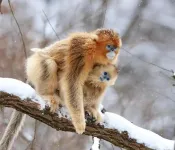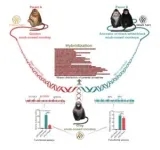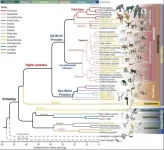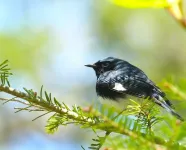(Press-News.org) For the first time ever, scientists have uncovered evidence that a species’ long-term adaptation to living in an extremely cold climate has led to the evolution of social behaviours including extended care by mothers, increased infant survival and the ability to live in large complex multilevel societies.
The new study, published today in the journal Science, was led by researchers from Northwest University in China and a team including the University of Bristol (UK) and the University of Western Australia, and examined how langurs and odd-nosed monkeys, part of the Asian colobine family, that can be found from tropical rainforests to snow-covered mountains, adapted over time.
These species were chosen by the researchers as they exhibit four distinct types of social organisation and provide a good model for examining the multiple mechanisms that have driven their social evolution from a common ancestral state to the diverse systems present today.
By integrating ecological, geological, fossil, behavioural and genomic analyses, the team found that colobine primates inhabiting colder environments tend to live in larger, more complex groups. More specifically, glacial periods during the past six million years promoted the selection of genes involved in cold-related energy metabolism and neuro-hormonal regulation.
They found that odd-nosed monkeys living in extremely cold locations had developed more efficient hormonal (dopamine and oxytocin) pathways that may lengthen maternal care, leading to longer periods of breast-feeding and an overall increase in infant survival.
These adaptive changes also appear to have strengthened relationships between individuals, increased tolerance between males and enabled the evolution from independent one-male, multi-female groups to large complex multilevel societies.
Dr Kit Opie, is one of the study’s authors from the Department of Anthropology and Archaeology at the University of Bristol. He said: “Our study identified, for the first time, a genetically regulated adaptation linked to the evolution of social systems in primates.
“This finding offers new insights into the mechanisms that underpin behavioural evolution in primates and could be used to address social evolutionary changes across a wide range of species including humans.
“In addition we would like to examine how changes in social and mating behaviour in many primate species may be the result of genetic changes due to past environments as well as other social and environmental factors.”
Dr Cyril Grueter is also an author of the study from the Department of Anatomy, Physiology and Human Biology at the University of Western Australia. He said: “With climate change becoming an hugely important environmental pressure on animals, it is hoped that this study will raise awareness for the need to investigate what course social evolution will take as the prevailing climate changes.”
“Our finding that complex multilevel societies have roots stretching back to climatic events in the distant evolutionary past also has implications for a reconstruction of the human social system which is decidedly multilevel.”
END
New study shows how adaptations to living in a cold climate promoted social evolution
2023-06-01
ELSE PRESS RELEASES FROM THIS DATE:
People divide complex tasks into simpler subtasks in a way that balances ease of planning with efficient behavior, consistent with a new computational theory
2023-06-01
Article URL: https://journals.plos.org/ploscompbiol/article?id=10.1371/journal.pcbi.1011087
Article Title: Humans decompose tasks by trading off utility and computational cost
Author Countries: USA
Funding: This research was supported by John Templeton Foundation grant 61454 awarded to TLG and NDD (https://www.templeton.org/), U.S. Air Force Office of Scientific Research grant FA 9550-18-1-0077 awarded to TLG (https://www.afrl.af.mil/AFOSR/), and U.S. Army Research Office grant ARO W911NF-16-1-0474 awarded to NDD (https://www.arl.army.mil/who-we-are/directorates/aro/). ...
LSU researchers show mobile elements monkeying around the genome
2023-06-01
Baboons (Papio) are found across the continent of Africa, from the west to the east and all the way south. They have doglike noses, impressive teeth and thick fur that ranges widely in color between the six species, which are olive, yellow, chacma, Kinda, Guinea and hamadryas. Their habitats vary from savannas and bushlands to tropical forests and mountains. Chacma baboons, the largest at up to 100 pounds, are even found in the Kalahari Desert, while the neighboring Kinda baboons, the smallest at around 30 pounds, stay near water. Most live in large troops with dozens or hundreds of members. While most baboons ...
The Primate Genome Project unlocks hidden secrets of primate evolution
2023-06-01
Co-led by Guojie Zhang from Centre for Evolutionary & Organismal Biology at Zhejiang University, Dong-Dong Wu at Kunming Institute of Zoology, Xiao-Guang Qi at Northwest University, Li Yu at Yunnan University, Mikkel Heide Schierup at Aarhus University, and Yang Zhou at BGI-Research, the Primate Genome Consortium reported a series of publications from its first phase program which includes high quality reference genomes from 50 primate species of which 27 were sequenced for the first time. These studies provide new insights on the speciation process, genomic diversity, social evolution, ...
Major primate genome sequencing studies reveal new insight into evolution, biodiversity and key applications for human health
2023-06-01
HOUSTON – (June 1, 2023) – A new investigation led by researchers at Baylor College of Medicine’s Human Genome Sequencing Center, the Institute of Evolutionary Biology and Pompeu Fabra University in Barcelona, Spain, and Illumina, Inc. analyzed the genomes of 233 nonhuman primate species and revealed key features of primate evolution, human disease and biodiversity conservation. The findings are published in a series of studies in a special issue of the journal Science.
The Primate Genome Project generated the most complete ...
Tiny quantum electronic vortexes can circulate in superconductors in ways not seen before
2023-06-01
Within superconductors little tornadoes of electrons, known as quantum vortices, can occur which have important implications in superconducting applications such as quantum sensors. Now a new kind of superconducting vortex has been found, an international team of researchers reports.
Egor Babaev, professor at KTH Royal Institute of Technology in Stockholm, says the study revises the prevailing understanding of how electronic flow can occur in superconductors, based on work about quantum vortices that was recognized in the 2003 Nobel Prize award. The ...
University of Miami selected to prestigious Association of American Universities
2023-06-01
The University of Miami has been chosen as one of the newest members of the esteemed Association of American Universities (AAU), a distinguished national organization of leading research universities founded in 1900.
The invitation to join the prestigious organization—considered the gold standard in American higher education—comes as the University’s research and sponsored program expenditures totaled more than $413 million in fiscal year 2022, demonstrating a critical focus to address the world’s most complex issues.
“There are special moments in the life of a university that not only reward our hard work but, more importantly, ...
Dr. Robert Harrington named dean of Weill Cornell Medicine
2023-06-01
Dr. Robert A. Harrington, a cardiologist and the Arthur L. Bloomfield Professor of Medicine and chair of the Department of Medicine at Stanford University, has been named the Stephen and Suzanne Weiss Dean of Weill Cornell Medicine and provost for medical affairs of Cornell University.
The appointment was approved by the Cornell Board of Trustees and the Weill Cornell Medicine Board of Fellows. Harrington - also a member of the National Academy of Medicine - will begin his new position on Sept. 12.
A past president of the American Heart Association (AHA), ...
Early career scientist wins prestigious Hungarian physics award
2023-06-01
Laszlo Horvath, an early career physicist at the U.S. Department of Energy’s (DOE) Princeton Plasma Physics Laboratory (PPPL) stationed at General Atomics in San Diego, is the winner of the 2022 Károly Simonyi Memorial Plaque from the Hungarian Nuclear Society. Established in 2007, the plaque “recognizes Hungarian researchers and engineers with outstanding achievements in the field of fusion plasma physics and technology.”
Horvath learned he had won the Simonyi Memorial Plaque not long ...
More evidence needed to confirm promise of remote or decentralized trials
2023-06-01
There’s one question that Hollings Cancer Center researcher Jennifer Dahne, Ph.D., co-director of the remote and virtual trials program at the South Carolina Clinical & Translational Research Institute, hears more than any other as she consults with clinical researchers about how to set up remote trials, also known as decentralized trials. Will these trials overcome the barriers that make it difficult for minority and underserved populations to participate in clinical trials? It’s also a question she often discusses ...
Forest birds with short, round wings more sensitive to habitat fragmentation, OSU study shows
2023-06-01
CORVALLIS, Ore. – Tropical forest birds, which tend to have wings that are short and round relative to their body length and shape, are more sensitive to habitat fragmentation than the long-, slender-winged species common in temperate forests, according to an international collaboration that included scientists from Oregon State University.
OSU’s Matt Betts and Christopher Wolf teamed with 14 other authors to analyze the wings of more than 1,000 species worldwide in a study led by Thomas Weeks of Imperial College London and ...









